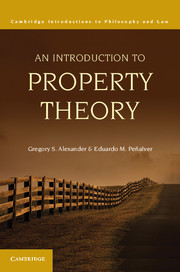1 - Utilitarian Property Theories
Published online by Cambridge University Press: 05 June 2012
Summary
As a leading property law casebook puts it, “[u]tilitarian theory is, without doubt, the dominant view of property today, at least among lawyers.” This is certainly true, but the story is also significantly more complicated. Although utilitarian analysis provides tremendous insight into the institution of property, it raises a number of important questions when treated as a comprehensive theory of property. Moreover, the term utilitarian masks a great deal of intellectual and methodological diversity. Rather than a single utilitarian theory, it is more appropriate to speak of a number of utilitarian (or even utilitarian-influenced) property theories. For our purposes, these utilitarian-influenced theories include many contemporary theories that refer to themselves as economic or welfarist. In this chapter, we will explore the broad outlines of these theories, focusing on their points of overlap and also on key areas of disagreement.
A BRIEF INTRODUCTION TO UTILITARIANISM
Utilitarianism is a consequentialist moral philosophy, that is, one that judges the rightness and wrongness of actions or rules or institutions by the goodness and badness of the consequences they bring about. Utilitarianism assesses the goodness or badness of consequences in terms of their tendency to maximize utility or welfare. Bernard Williams has observed that “[t]he fathers of utilitarianism thought of it principally as a system of social and political decision,” as opposed to “a system of personal morality.” As Williams correctly notes, it is sometimes hard to keep these two domains apart. Nevertheless, it is plainly as a theory of social choice that utilitarianism has been deployed in the context of property theory.
- Type
- Chapter
- Information
- An Introduction to Property Theory , pp. 11 - 34Publisher: Cambridge University PressPrint publication year: 2012
References
- 1
- Cited by

